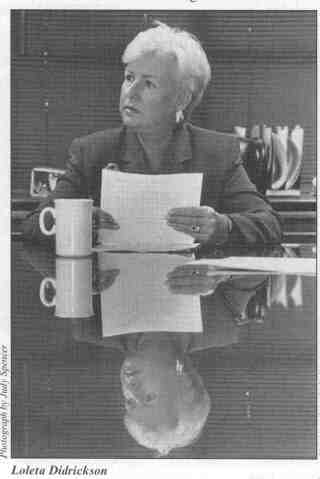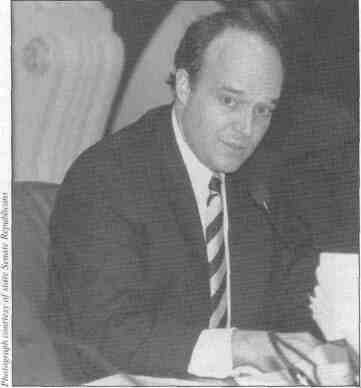|
Campaign perspective SELF-INFLICTED WOUNDS
Republicans are more likely to take shots at one another Analysis by Rick Pearson The image of Illinois Democrats is that of a wartime firing squad convened in a circle. A party that's open to all comers destructs from within, according to the prevailing wisdom, and the factious splits that have become a tradition among Democrats lead to Republican victories. But when the office of U.S. Senate is at stake, it's the Republicans who blindfold themselves against self-inflicted wounds. Take this year's primary contest between Peter Fitzgerald and Loleta Didrickson. It highlights once more the uneasy coexistence of conservatives and moderates who make up the Illinois Republican Party. No matter who wins, the campaign that culminates on March 17 will force that party's members to face again the fractiousness that keeps them from getting one of their own into Washington's most exclusive club. For the last decade and a half, the GOP has consistently fielded largely ill-prepared, uninspired and disappointing senatorial candidates. Can anybody remember the campaigns of George Ranney, Judy Koehler, Lynn Martin, Richard Williamson and Al Salvi with a straight face? Can anybody remember much about them at all? Here's a hint: Each of those failing campaigns was the result of dissention within the Republican ranks. Or disinterest on the part of the leadership. Or both. At the start of this year's campaign, Republicans seemed to have a bead on victory. Incumbent Democratic U.S. Sen. Carol Moseley-Braun, wounded by controversy over her finances and friends, is considered one of the nation's most vulnerable Senate targets for the GOP. Yet, with the primary fast approaching, Illinois Republicans continue to gaze inward, apparently more disposed to take aim at one another, wasting political ammunition for the sake of a philosophical point. Displaying the conservative colors in this year's primary is Fitzgerald, 37, an attorney and wealthy banking scion from suburban Inverness. Elected to the state Senate in 1992 as part of a group of freshman conservatives who came to be known as the "Fab Five" of Senate President James "Pate" Philip's Republican majority, he has attacked the "casino cartel" and blasted "cozy" relationships among GOP business- people, power brokers and elected officials. On social issues, he opposes abortion and backs gun-owner rights. On fiscal issues, he's against a general increase in state taxes. "I would like to be our party's nominee in 1998 to bring back to the forefront our party's best issue: taxes and government spending," he told party leaders at the year-end Republican State Central Committee meeting. "I have a strong record in the Illinois Senate as one of the best fiscal conservatives, and I've won awards from taxpayer watchdog groups all across this state. I have a winning record on taxes and spending that I hope could lead our party to victory in 1998." Representing the party's moderate wing is Didrickson, 56, who was elected state comptroller in 1994 as part of the GOP sweep of all major statewide offices. A four-term state representative who hailed from Flossmoor but now resides in Chicago, she left the General Assembly to become director of the Department of Employment Security in Gov. Jim Edgar's administration before winning statewide office. Didrickson has sought to soften Republicans' country club image. She's a self-described fiscal conservative and a social moderate who supports abortion rights and gun control. The politically aggressive Didrickson told party leaders in December: Philosophy be damned. Or words to that effect. "This is all about winning. This is all about nose-counting. This is all about who can get more votes than the other person," Didrickson said. "People do want, and Republican primary voters do want, somebody with a mainstream common-sense conservative approach on fiscal issues, but [someone who is] not too extreme to the right on social issues." There's nothing new about the 26 / February 1998 Illinois Issues schism between the GOP'S conservative and moderate wings. It isn't exclusive to Illinois. Nor is it especially deep compared to some other states. Yet when the clout that comes with jobs and contracts and executive power isn't at stake, when it's simply a race for a seat in the most powerful legislative body in the Free World, a more contentious Republican Party rears its head in Illinois: a party of introspection, even self-flagellation; a party where populism challenges peerage; a party with strong warring factions but no unifying core. The split may appear now and again in the race for governor, as it did in 1990, but the epicenter remains the campaign for U.S. Senate. That has been true since 1984, when popular Democratic Congressman Paul Simon defeated three-term incumbent Republican Sen. Charles Percy in a bitter general election that both men would likely acknowledge was beneath their dignity.
Ultimately, Salvi was too conservative for general election voters. He opposed gun control, which didn't play well in the city, and he opposed abortion rights, which didn't play well among suburban women. And, having no seasoning in a statewide campaign, he stumbled badly at the end, making an off-the-cuff accusation that former Reagan press secretary Jim Brady, wounded in an assassination attempt, had been a gun dealer. Of more than 4.1 million ballots cast, Salvi got only 42 percent of the vote compared to Durbin's 58 percent, even losing his suburban home county of Lake. This year could be different. In Moseley-Braun, Republicans see a ready-made bull's-eye of an incumbent who barely squeaked into office. She has been dogged by numerous controversies: not paying her mother's Medicaid debt, awarding her boyfriend an extravagant salary to run her campaign and traveling with him to visit the oppressive Nigerian regime of dictator Sani Abacha without the knowledge of her own staff or approval by the U.S. State Department. Yet, Moseley-Braun's luck has continued to hold. Edgar decided to make 1998 his last year in public office, declining a bid for either the Senate or re-election. Then Edgar's choice for the Senate race, Atty. Gen. Jim Ryan, opted to seek re-election. Now Republicans are once again facing a conservative/ moderate battle in the primary. And the moderate has the look of a reluctant draftee. Fitzgerald had already been clearing his throat in the wings, when, after twice rejecting a bid for the Senate, Didrickson reversed course again and decided to run for the job, acceding to the wishes of presumptive GOP gubernatorial nominee George H. Ryan and state Republican Chairman Harold Byron Smith. But in throwing down the gauntlet against Fitzgerald and the conservative faction of the party, the mainstream Republicans' full-court press for Didrickson points up how little regarded the office of U.S. Senate has become for a party more interested in retaining the Executive Mansion and control of state government. Ryan and Smith believe a moderate woman would be a more significant opponent in a head-to-head race against Moseley-Braun. But they also know that Didrickson's candidacy — along with Ryan's selection of moderate freshman Rep. Corinne Wood as a running mate Illinois Issues February 1998 / 27 — serves to inoculate Ryan in a general election against charges that he's anti-woman. Ryan is against abortion, and he opposed the Equal Rights Amendment while serving as speaker of the Illinois House. Meanwhile, House GOP leader Lee Daniels of Elmhurst, who predicted Didrickson would lose to a conservative while she was pondering a bid for secretary of state (and all the state jobs that office oversees), praised her candidacy after she announced for the Senate. Though she faces a conservative, primary challenge in that race as well. While Edgar's indecision — and her own — has forced Didrickson to play catch-up, the party's strategy has forced her to play defense. She launched her campaign by denying that she's little more than a female figurehead for the GOP ballot. "I threw my hat in the ring to run for the U.S. Senate with strong encouragement but no arm twisting," Didrickson says. "This is a great opportunity and, as we look at the much beleaguered senior United States senator that we have representing us, we have a golden opportunity that we cannot fritter away." For his part, Fitzgerald spent the early days of the campaign promoting his independence from party leaders and blasting them for fomenting a moderate primary challenge. "These political insiders are the ruling elite of our time," Fitzgerald warned as he announced his candidacy in October. "These are the guys who cut the backroom deals. These are the power brokers who can anoint a ticket behind the scenes." Yet two months later, while appearing before the Republican State Central Committee, he thanked party members for their service, especially "some of you [who] have been carrying water for the elephant perhaps before I was born."
Fitzgerald, meanwhile, already has a conservative base that traditionally shows up for Republican primaries. He will attempt to cast Didrickson in the mold of a Moseley-Braun liberal while trying not to alienate the moderate general election voters he would need in the fall. Both messages will require money. But Fitzgerald can tap his $40 million personal wealth without fear of violating federal spending limits of $1,000 donations from individuals and $5,000 contributions from political action committees. Didrickson, with just under $500,000 in the bank at the end of December and the need to raise $2 million more, must count on fund-raising help that includes her national campaign chairman Bob Dole, former Gov. Jim Thompson and party chairman Smith. But in a year in which all six statewide constitutional offices are up for election, including a governor who will have the power to sign off on a new legislative redistricting map, and in a year in which partisan control of the General Assembly is at stake, even a high-profile candidate for office like Didrickson may have trouble gathering campaign funds. That leaves the decision for a senatorial nominee in the hands of the roughly 800,000 voters who turn out for Republican primaries. Is Fitzgerald's ideology, which has been a general election loser, still mild enough to defeat a problem-plagued incumbent? Or will Didrickson's moderation be enough to cancel Moseley-Braun's support for such gender-based social concerns as abortion and guns? If past history is any guide, Republicans picking a U.S. Senate nominee will provide further proof that bullet voting never really ended in Illinois. Anyone have a blindfold? Rick Pearson is the political writer or the Chicago Tribune. 28 / February 1998 Illinois Issues
|


